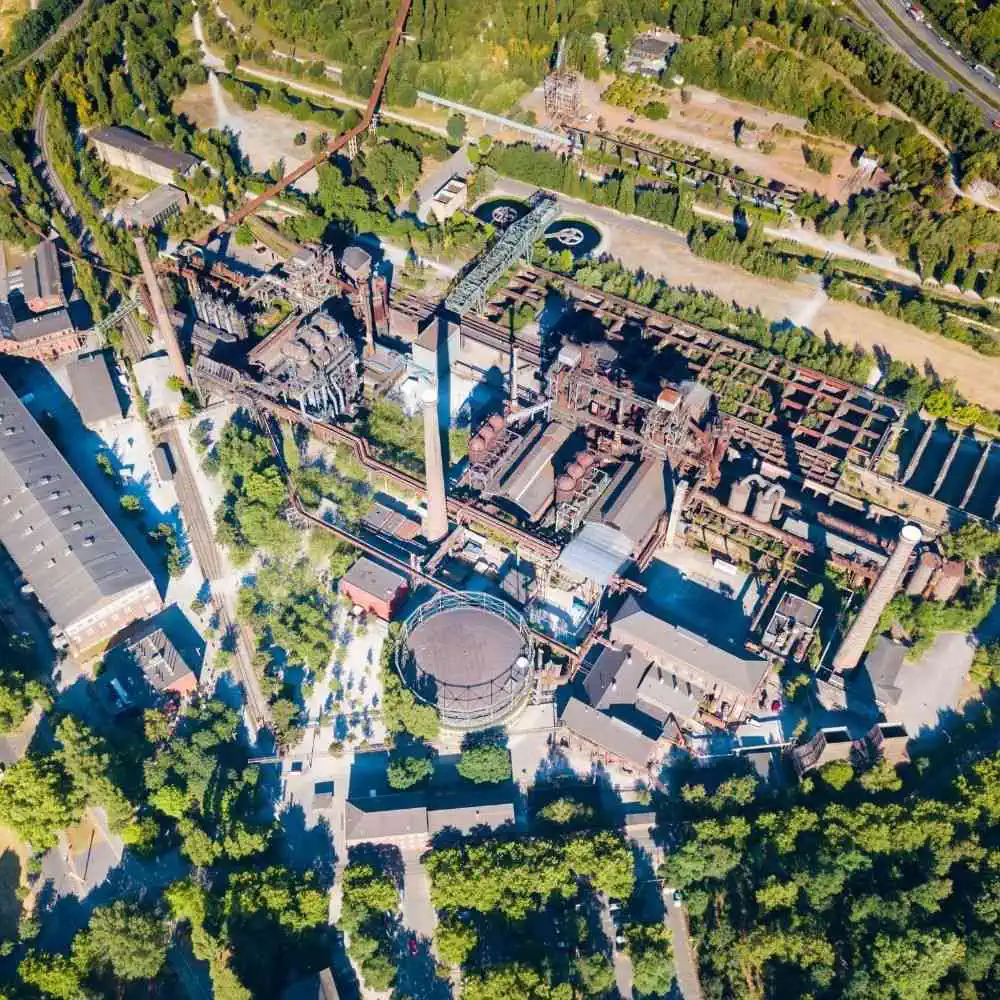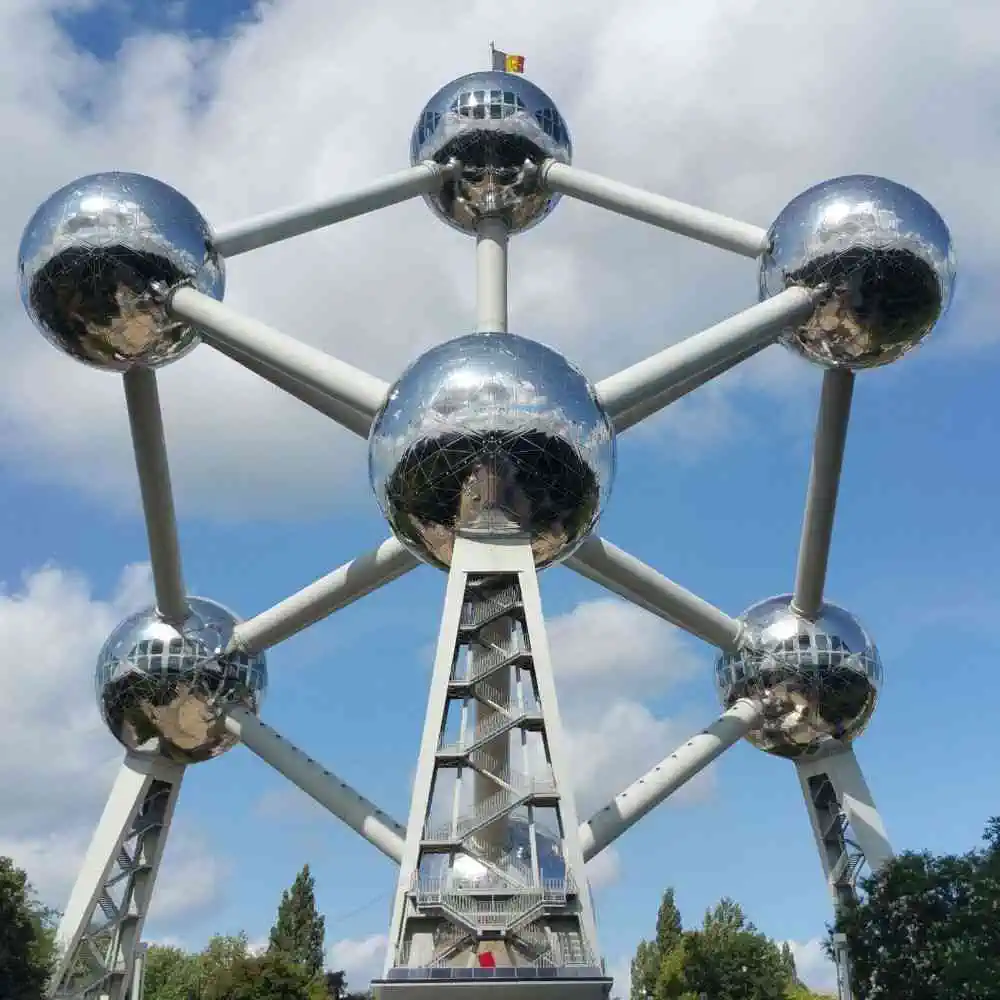Partirai da Bruxelles-Centrale, situata proprio nel centro della città di Bruxelles, e godrai del bellissimo paesaggio del viaggio mentre arrivi a Duisburg Stazione Centrale, situata anche essa nel cuore di Duisburg.
Treni da Bruxelles a Duisburgda € 30.00
Treni da Bruxelles a Duisburg
Viaggiare in treno: Bruxelles - Duisburg
The shortest duration for this journey is around 4 hours and 45 minutes, with many popular trains such as Thalys, ICE, and Eurocity offering the connection. Along the way, you'll pass through some of huge cities and towns such as Cologne, Essen, and Düsseldorf. Taking the look outside the train window, you'll be able to spot some of the most iconic attractions in Germany, including the Cologne Cathedral and the Historic Old Town of Düsseldorf.
When it comes to departure and arrival, Brussels-Midi station and Duisburg station offer an interesting array of things to see and do. Some of the most eye-catching attractions in Brussels-Midi include the giant electronic clock, the Art Deco style building, and the surrounding park. At Duisburg station, the red sandstone remains of the old Duisburg Castle make it quite a sight to behold. In conclusion, if you want a quick and convenient way to travel from Brussels to Duisburg, taking the train is your best bet – it's reliable, comfortable and will take you through many of the most iconic sights and attractions. So why not go ahead and plan your journey today?
Dettagli del viaggio
How long does the train from Brussels to Duisburg take?
The journey time for the train from Brussels, Belgium, to Duisburg, Germany, can vary, but the average trip lasts approximately 3 hours.
What is the fastest journey from Brussels to Duisburg by train?
The quickest train trip from Brussels to Duisburg is around 2 hours and 20 minutes.
How much does the train cost from Brussels to Duisburg?
Train ticket prices from Brussels to Duisburg can vary widely, but expect to pay from €19 to €60, depending on booking time and travel class.
How much does the Brussels to Duisburg?
Yes, there are direct train services available from Brussels to Duisburg, offering a convenient and efficient way to travel between these cities.
What is the distance from Brussels to Duisburg by train?
The distance from Brussels to Duisburg by train is approximately 219 Km.
Which are the cities that the train stops from Brussels to Duisburg?
On its way from Brussels to Duisburg, the train may stop in major cities like Liège in Belgium and Aachen in Germany, among others.
Bruxelles: Luoghi da visitare
Scoprire Bruxelles, capitale del Belgio, è un'immersione in un mix affascinante di storia, arte e cultura europea. La città offre un'architettura straordinaria, musei di fama mondiale e una scena culinaria ineguagliabile. Ecco un itinerario dei siti imperdibili per vivere il meglio di Bruxelles.
Grand Place: Questa piazza storica, patrimonio dell'umanità UNESCO, è circondata da opulenti edifici del XVII secolo. Centro nevralgico della città, la Grand Place è rinomata per il suo splendore architettonico.
Ubicazione: Centro città
Orari: Accessibile 24 ore su 24, edifici circostanti hanno orari variabili
Costo: Accesso gratuito alla piazza
Consigli: Visitare durante il Flower Carpet Festival per ammirare una spettacolare esposizione floreale.
Atomium: Simbolo di Bruxelles, questa struttura atomica offre una vista panoramica sulla città. Costruito per l'Expo del 1958, l'Atomium rappresenta la maglia di un cristallo di ferro ingrandita 165 miliardi di volte.
Ubicazione: Heysel Park
Orari: 10:00-18:00
Costo: Circa 15€ per adulto
Consigli: Visitare al tramonto per una vista mozzafiato.
Manneken Pis: La famosa statuetta di bronzo raffigurante un bambino in procinto di urinare è diventata un'icona di Bruxelles.
Ubicazione: Incrocio tra Rue de l'Étuve e Rue du Chêne
Orari: Visibile in qualsiasi momento
Costo: Gratuito
Consigli: Cercare le versioni vestite del Manneken Pis durante le feste nazionali.
Palazzo Reale: La residenza ufficiale della monarchia belga, aperta al pubblico durante l'estate, è un capolavoro di stile neoclassico.
Ubicazione: Place des Palais
Orari: Luglio-Agosto, 10:30-17:00
Costo: Ingresso gratuito
Consigli: Non perdere la Sala dello Specchio, adornata con milioni di scaglie di scarabeo.
Musei Reali delle Belle Arti: Questo complesso museale ospita una vasta collezione d'arte, dalla pittura fiamminga antica all'arte moderna.
Ubicazione: Rue de la Régence
Orari: 10:00-17:00, chiuso il lunedì
Costo: Circa 10€ per adulto
Consigli: Dedicate almeno mezza giornata per esplorare le diverse sezioni del museo.
Cattedrale di San Michele e Santa Gudula: Splendido esempio di architettura gotica, la cattedrale è nota per le sue vetrate maestose.
Ubicazione: Place Sainte-Gudule
Orari: 07:00-18:00
Costo: Ingresso gratuito, piccola donazione per la visita della cripta
Consigli: Assistere a uno dei concerti d'organo che si tengono regolarmente.
Parlamento Europeo: Per comprendere meglio l'Unione Europea, visitate la sede del Parlamento. La visita offre insight sul funzionamento dell'UE.
Ubicazione: Espace Léopold
Orari: Lun-Ven, orari variabili per le visite
Costo: Gratuito
Consigli: Prenotare in anticipo la visita guidata per un'esperienza più completa.
Per quanto riguarda la gastronomia, non si può lasciare Bruxelles senza aver provato le famose gaufre (waffle), i moules-frites (cozze con patatine fritte) e il cioccolato artigianale.
Esplorare i dintorni di Bruxelles offre ulteriori meraviglie, come le fiabesche città di Bruges e Ghent, facilmente raggiungibili in treno per gite di un giorno. Bruxelles, con il suo fascino storico e le delizie culinarie, promette un'esperienza indimenticabile ad ogni visitatore.

Duisburg: Luoghi da visitare
Duisburg, located in the North Rhine-Westphalian state of Germany, is a city of great historical and architectural significance that has a lot to offer tourists. From cathedrals and churches to parks and museums, you’ll find plenty of unique sites to explore. Here are the top must-visit historical and architectural sites to check out, as well as some delicious food you can try during your trip.
Duisburg Inner Harbor: A UNESCO World Heritage Site, the Duisburg Inner Harbor combines the best of industrial heritage and modern technology. The visitor center provides an insight into the area’s 19th century steamship trade, as well as the history of the harbor. The harbor is free to visit, and is open all days except Tuesdays.
Duisburg Cathedral: The Gothic cathedral of Duisburg dates back to the year 1300 and is a beautiful example of late medieval architecture. The ornate external decoration of the cathedral, including its stained glass windows, is particularly worth admiring. Admission is free and the cathedral is open from Tuesday to Sunday.
Museum Folkwang: This renowned art museum is home to a vast collection of modern art from around the world. The museum houses both permanent and temporary exhibits, with works by famous artists such as Cezanne, Klee, and Picasso. The museum is open all days except Mondays and admission is free.
Landscape Park Duisburg-Nord: Formerly a steelworks, this modern park is today a vast green space that includes a lake, hills, and a picturesque forest. The park is free to enter and is open all days. It is a perfect spot to relax and enjoy some peace and quiet in the midst of a bustling city.
Kaiserberg Park: This ornamental park is home to a lake, a castle, and a botanical garden, as well as several interesting sculptures. There is also a spectacular view of the city from the park's hill. The park is open all days and admission is free.
Sea Life Oberhausen: Located just outside the city limits, this aquarium is the largest of its kind in Germany, and is home to an impressive collection of aquatic species from around the world. It is open all days and admission fees vary according to the type of ticket purchased.
Duisburg Gourmet Market: This market is the perfect place to try some of the city’s traditional German dishes, such as bratwurst, schnitzel, and spätzle. The market also has a wide selection of drinks and desserts, making it a great place to end a day of sightseeing.
Whether you’re looking to admire the city’s historical and architectural sites, or just looking for a unique culinary experience, Duisburg has something to offer everyone. The sites included on this list represent only a fraction of what the city has to offer, and you’re sure to leave with lots of incredible memories.

Bruxelles: Principali stazioni ferroviarie
Bruxelles, capitale del Belgio, è un crocevia ferroviario chiave per i viaggiatori in Europa. La stazione principale, Bruxelles-Midi, non è l'unica nell'ambito cittadino; le stazioni Bruxelles-Centrale e Bruxelles-Nord giocano anche loro un ruolo importante nella rete ferroviaria, facilitando l'accesso a diverse parti della città e a destinazioni internazionali. Questa diversità garantisce flessibilità e convenienza per i passeggeri, rendendo i viaggi in treno da e per Bruxelles un'esperienza senza soluzione di continuità.
La stazione Bruxelles-Midi si trova all'indirizzo Avenue Fonsny 47B, strategicamente posizionata per fornire un facile accesso sia al centro città che ad altre destinazioni europee. Gli orari di apertura variano, ma la stazione è generalmente accessibile dalla mattina presto fino a tarda sera, garantendo che i viaggiatori possano sfruttare al massimo i loro itinerari. I servizi di deposito bagagli sono disponibili per comodità dei passeggeri, permettendo loro di esplorare la città con le mani libere prima della partenza o dopo l'arrivo. Tali servizi rendono la stazione Bruxelles-Midi non solo un punto di transito ma anche un comodo punto di partenza per l'esplorazione di Bruxelles e oltre.
- Bruxelles-Centrale
- Bruxelles-Midi
- Brussels-Airport-Zaventem
- Bruxelles-Luxembourg
- Bruxelles-Nord
- Bruxelles-Schuman
- Bruxelles-Chapelle
- Bruxelles-Congrès
- Bruxelles-Ouest
Duisburg: Principali stazioni ferroviarie
Duisburg is located in Germany and has one of the largest train stations in the country, the Duisburg Hauptbahnhof. It covers all rail transport services within the city and provides direct connections to other major stations in the country such as Dusseldorf, Essen and Köln. It is also the starting point of major regional and international lines such as the InterCity Express and EuroNight.
The main station of Duisburg features an information centre with opening hours from Monday to Friday from 8:30am to 7:30pm and Saturdays from 8:30am to 2:30pm. The address of the main station is Obenmarspforten 5, 47051 Duisburg, and the contact telephone number is 49203 784-0. In addition to ticket offices and ATMs, the station also provides services for passengers such as a left luggage office, a luggage cart rental counter and a café.
- Duisburg Stazione Centrale
Bruxelles - Duisburg: Come ottenere le migliori offerte
Prenota in anticipo:
Come per le tariffe aeree, i prezzi dei biglietti dei treni tendono ad aumentare man mano che si avvicina la data di partenza. Prenotare settimane o addirittura mesi in anticipo può farti risparmiare una notevole quantità.
Viaggia durante le ore di minore affluenza:
Evita di viaggiare durante le ore di punta, come le mattine e le serate feriali. Opta per viaggi a metà giornata, tarda serata o a metà settimana quando c'è meno domanda.
Considera treni più lenti o percorsi non diretti:
I treni espressi o ad alta velocità possono risparmiare tempo, ma spesso sono più costosi. Optare per servizi regionali o più lenti può ridurre la tua tariffa.
Cerca offerte speciali e promozioni:
Le compagnie ferroviarie occasionalmente hanno promozioni o offerte speciali, specialmente durante le stagioni di bassa affluenza. Vale la pena iscriversi alle newsletter. Inoltre, a volte ci sono sconti per gruppi o per biglietti di ritorno, quindi considera queste opzioni se si adattano ai tuoi piani di viaggio.
Argomenti popolari
Tutto ciò che c'è da sapere su
Hai bisogno di aiuto?
- Contattaci
Pagamento sicuro garantito
Certificati


